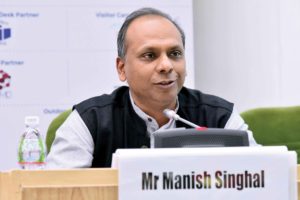Singhal is excited about building one of India’s first AI and deep-tech focused venture capital funds. Several well-known entrepreneurs including Deep Kalra and Sanjeev Bikchandani have invested in pi Ventures.

Manish Singhal (an angel investor and an entrepreneur who also co-founded LetsVenture) and Umakant Soni (who worked with Science Inc. and was the co-founder of an AI BOT company) believe that irrational, exponential ideas can have a deep impact on the world, if entrepreneurs have the right attitude. They founded pi Ventures, with the goal of backing such entrepreneurs pursuing businesses in applied artificial intelligence (AI), machine learning and IoT to solve key problems in healthcare, logistics, retail, fin-tech and enterprise sectors.
The fund has a target corpus of Rs. 200 crore and is backed by some prominent entrepreneurs like Bhupen Shah, co-founder of Sling Media, Sanjeev Bikhchandani, founder of Info Edge and Deep Kalra, founder of MakeMyTrip, among others.
Singhal and Soni are looking at companies that are leveraging big data (data coming out of enterprise systems), small data (personal data) and dark data (data coming out due to devices) to make smarter decisions through machine learning. They believe that mining this data using machine learning and AI will create new category leaders in various sectors and that’s exactly what pi Ventures is going after.
So far, the fund has invested in Sigtuple (a blood diagnostics company), ten3T health (a heart monitoring company) and Zenatix (a machine learning driven energy management for retailers) and plans to make another 18 to 24 investments through the life of the fund.
In this interview, Manish Singhal talks to us about his vision for pi Ventures and the finer nuances of building a frontier technology startup in India.
For an AI startup, there are two critical aspects: algorithmic maturity and a smart data strategy
![]()
What was the main trigger for you to set up pi Ventures and why choose the space of Artificial Intelligence?
While pi Ventures was set up in January 2016 the seeds were sown way back in 2014 when I was heading LetsVenture. I had invested in locus.sh and their work excited me and brought back the memories and passion from 15 years back of working on algorithms.
After doing considerable research in this space, I got a few key insights. One, data is an integral part of every product today. And products of the future will derive better intelligence from that data. If you look at all the technologies, the best way to derive intelligence from data is machine learning and deep learning, using AI techniques. So, we felt that this technology can change the way products are built and it will cut across sectors.
Ten years back we were asking start-ups whether they are having cloud presence or not but now we take it for granted. We believe that this same thing will happen to AI in a year or two.
Second, there are many ways of using data for intelligence. And since it is a specialised activity, it needs people with special skills and knowledge to make good sense of it as users. That was the reason why we thought a specialised fund will do better in this space. We are very hands-on people and understand algorithms, deep technology and the art of writing code. We believe that’ll make a key difference to our approach of working with our entrepreneurs and the startup community as a whole.
What is your contribution towards nurturing this ecosystem?
We believe that just funding start-ups is not enough. We want to see more companies coming in. We started an initiative called the #chAI where on a monthly basis we call one AI practitioner to talk about how they apply the concept of AI/machine learning to their business problem. We have done 8 events so far and around 50 people turn up for each event and there are discussions on technology and market.
What started as a learning session has now become viral (within the tech community) with deep discussions. Personally, it has been a terrific experience for me. I believe, #chAI creates a whole positive learning vibe within the emerging deep-tech ecosystem.
Apart from a great team, good market and strong founding team, what are the other factors that make you say yes to a deal?And, when do you say no?
We look at two aspects: One, their algorithmic maturity. You can call it intellectual property – how strong is it, how defensible is it. We also look at data strategy – the more the data, the better the algorithm. So we look at data strategy – how they are getting data, how they are curating it, do they buy data or is it a natural outcome of something they do. So these two things: algorithmic maturity, which is IT oriented, and data, which is strategic.
These factors apart, I am also a psychologist and a trained coach and this qualification, I believe, helps me assess the founder’s ability better.
Please recall for us your first investment…
We invested in Ten3T, an ECG company, in December 2016. The company has created a smart watch which is simple to use and doesn’t need medical training to use. The founder walked in to my office and took an ECG in a simple way, which created a lot of interest.
We started an initiative called #chAI where on a monthly basis we call one AI practitioner to talk about how they apply the concept of AI/machine learning to their business problem
What is it about your role that excites you?
I spent a large part of my career being a technologist and hence, what excites me is the ability this role gives me to support innovation. My learning curve as an investor is 10x more than that of an entrepreneur from various perspectives. I meet a lot of entrepreneurs and look at different ideas. Every time I interact with the company, I learn something new.
While we are not able to work with all companies that approach us, we want to closely help our group of entrepreneurs to build a great company, with great products, and then assist them in getting to the market.
Where do you see the PE/VC ecosystem in India 10 years from now?
Last year and half, there was a significant drawback on capital in India and that is the best thing that could have happened from the funding perspective. Let me explain why. What was happening earlier was that a lot of companies were getting funded, even those who didn’t have a strong business model. So they were taking a lot of capital away from investors and companies working on product IPs were starved for capital. So now capital is available for product innovation. I do believe that next set of big companies coming out of India will be companies that are solving global problems and have core IP backing. This transition is happening as we speak and this drawback is good as it will create a stronger space. Over the next few years, India will emerge as an innovation/IP-led product ecosystem.
According to you, what are the “yet-to-be-hot” sectors?
AI cuts across sectors like healthcare and logistics. One sector, we are excited about is the healthcare sector. We have seen some tremendous applications of AI in healthcare. Out of our four investments, three are in the healthcare space.

